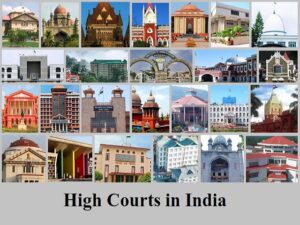Total High Courts in India
The total number of high courts in India is 25.
|
List of High Courts in India |
|||
| Name | Year | Territorial Jurisdiction |
Seat |
| Kolkata | 1862 | West Bengal, Andman & Nicobar Islands | Kolkata ( Bench of port Blair) |
| Bombay | 1862 | Maharastra, Dadar, & Nagar Haveli. Goa, Daman Diu | Mumbai (Bench at Panaji, Aurangabad and Nagpur) |
| Chennai | 1862 | Tamil Nadu & Pondicherry | Chennai (Bench at Madurai) |
| Allahabad | 1866 | Utter Pradesh | Allahabad (Bench at Lucknow) |
| Karnataka | 1884 | Karnataka | Bengaluru (Bench at Dharwad and Gulbarga) |
| Patna | 1916 | Bihar | Patna |
| Jammu & Kashmir | 1928 | Jammu & Kashmir | Sri Nagar & Jammu |
| Punjab & Haryana | 1947 | Punjab, Haryana , Chandigarh | Chandigarh |
| Guwahati | 1948 | Assam, Nagaland, Mizoram and Arunachal Pradesh | Guwahati (Bench at Kohima, Aizawl and Itanagar |
| Orissa | 1948 | Orissa | Cuttack |
| Rajasthan | 1949 | Rajasthan | Jodhpur ( Bench – Jaipur) |
| Madhya Pradesh | 1956 | Madhya Pradesh | Jabalpur (Bench –Indore , Gwalior) |
| Kerala | 1958 | Kerala & Lakshadweep | Ernakulam |
| Gujarat | 1960 | Gujarat | Ahmedabad |
| Delhi | 1966 | Delhi | Delhi |
| Himachal Pradesh | 1966 | Himachal Pradesh | Shimla |
| Sikkim | 1975 | Sikkim | Gangtok |
| Chhattisgarh | 2000 | Chhattisgarh | Bilaspur |
| Uttarakhand | 2000 | Uttarakhand | Nainital |
| Jharkhand | 2000 | Jharkhand | Ranchi |
| Tripura | 2013 | Tripura | Agartala |
| Manipur | 2013 | Manipur | Imphal |
| Meghalaya | 2013 | Meghalaya | Shillong |
| Andhra Pradesh | 2019 | Andhra Pradesh | Amravati |
| Telangana | 2019 | Telangana | Hyderabad |
Powers and Functions of High Court
High Court has the following jurisdiction and powers:
1) Power to issue certain writs:-Every High Court has the power to issue writs of habeus corpus, mandamus, prohibition, quo-warranto and certiorari for the enforcement of Fundamental Rights or for other purpose.
2) Power of Superintendence: Every High Court has superintendence over all Courts and Tribunals throughout the territories in relation to which it exercises jurisdiction.
3) Power to transfer case: If the High Court is satisfied that a case pending in a court subordinate to it involves a substantial question of law as to the interpretation of the Constitution, the determination of which is necessary for the disposal of the case, it shall withdraw the case and may-
- either dispose of the case itself; or
- determine the said question of law and return the case to the court from which the case has been so withdrawn together with a copy of its judgement on such question, and the said court shall on receipt there of proceed to dispose of the case in conformity with such judgement.
4) Consultation in the appointment and posting etc. of District Judges: The High Court is consulted by the Governor in the appointment, posting and promotion of District Judges. It is also consulted in the appointment of other members of the State Judicial Service.
5) Control over subordinate courts: The control over district court and courts subordinate thereto including the posting and promotion of and the grant of leave to persons belonging to the judicial service of a State and holding any post inferior to the post of district judge is vested in the High Court.
6) Other original and appellate powers: Hight Court has original and appellate jurisdiction in civil and criminal matters as conferred by the Codes of Civil and Criminal Procedure and the Letters of Patent.
Appointment of the Judges
- The Chief Justice of a High Court is appointed by the President with the consultation of the Chief Justice of the Supreme Court and the Governor of the State.
- The other judges are appointed by the will of President, Governor and the Chief Justice of High Court.
Qualifications for the Judges
- He should be a citizen of India.
- He should have been an advocate in one or more High Courts in India or a judge for at least 10 years in subordinate courts in India.
Tenure:
- Originally the age of the retirement of the judges of the High Courts was fixed at 60 but it was raised to 62 in 1963 according to the 15th amendment of the Constitution.
Removal of the Judges
- A judge may leave his office by resigning. He will send his letter of resignation to the President.
- His office would be considered to have been vacated if he is appointed as a judge of the Supreme Court or is transferred to some other High Court.
- A judge of a High Court may also be removed like a judge of the Supreme Court. A judge of High Court may be removed by the President if the Parliament passes a motion against him by an absolute majority and 2/3rd majority of the members present and voting, both the Houses sitting separately.
 8am-8pm
8am-8pm



